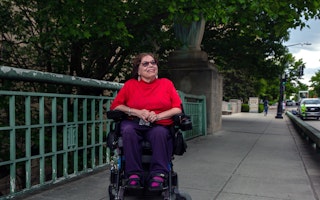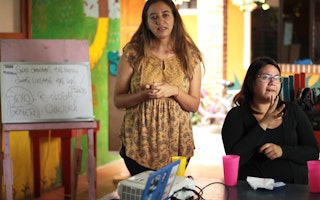Moving Beyond Institutions and Supporting Independent Living in Europe
By Katharine Boaden

Simona lived in an institution in Romania for 34 years, where she endured poor living conditions and unnecessary restrictions. Three years ago, Simona moved into a regular house in the town of Mihailesti. She now has friends, a job, the ability to make her own decisions about her life—freedom, in a word.
Unfortunately, if the European Union does not act now to implement Article 19 of the UN Convention on the Rights of People with Disabilities—which mandates the right of people with disabilities to live independently and be included in the community—the freedom Simona now experiences will remain out of reach for those hundreds of thousands of other Europeans with disabilities who are still confined to institutions.
Residential institutions are often little more than prisons for the disabled, where serious human rights violations have been documented and exposed for decades. Yet despite the fact that institutionalization denies people their basic rights and limits their access to education, jobs, and other services, millions of euros in EU structural funds—the money awarded to member states to reduce inequalities and improve living standards—have been used to renovate old institutions or build new ones.
Over the past decade, for example, Slovakia alone has spent more than €150 million to renovate existing residential institutions. EU money was also used to fund institutions in Bulgaria, Hungary, Latvia, Lithuania, Romania, the Czech Republic, Estonia, and Poland. All this, despite overwhelming evidence that people with disabilities thrive when they are included and supported in communities that respect their rights and dignity.
The European Network on Independent Living (ENIL), a network of organizations representing Europeans with disabilities, is working to ensure that structural funds are no longer used to violate these rights. ENIL’s campaign EU Funds for Our Rights calls on the European Commission and EU member states to adopt strict monitoring mechanisms and intervene when the funds are misused for institutionalization.
ENIL screened the documentary Here I Am at the European Parliament in November to raise awareness about the campaign. The short film above follows the stories of Simona and others who have flourished since leaving institutions.
The EU is now investing millions more in services for people with disabilities as part of its 2014–2020 funding strategy, and has earmarked funds to support the transition from institutional to community-based care. But there is a significant risk that these funds will be invested in services that continue to segregate people with disabilities. For example, many EU countries are planning to use the funds to build small group homes, often isolated from the local community, where residents will be expected to live according to strict rules.
To ensure that the EU keeps its promises, ENIL is supporting civil society organizations from 18 EU member states to advocate for and monitor funding that supports independent living. ENIL is also campaigning to ensure that the EU introduces an efficient and accessible complaints mechanism, so that any potential misuse of structural funds can be reported and rectified swiftly.
The message of ENIL’s campaign is simple: people with disabilities have a right to live independently and be part of their communities. The European Union has the money and power to make this happen, and it is time that it steps up to make the right to independent living a reality.
The European Network on Independent Living is a grantee of the Open Society Foundations.
Until December 2018, Katharine Boaden was a program officer with the Open Society Public Health Program.


